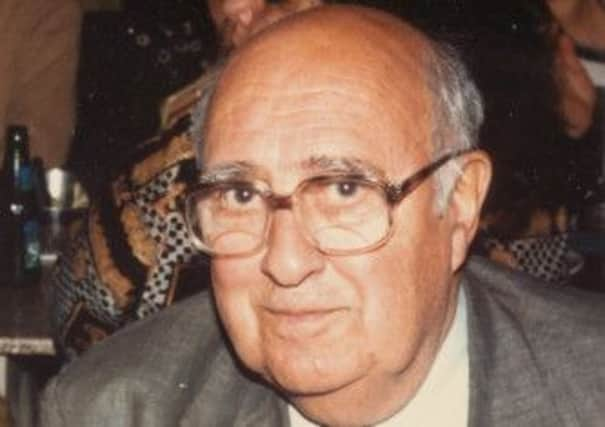Obituary: Dr David Purves, BSc, PhD, writer in Scots


After service in the Royal Air Force during the Second World War, he obtained an honours degree and PhD in biochemistry at Edinburgh University. Following research work on nuclear biochemistry and grass conservation, he joined the staff of the East of Scotland College of Agriculture in 1956, where he was responsible for the analysis of plants and soils for trace elements, in relation to the issue of plant and animal nutrition in south-east Scotland.
Advertisement
Hide AdAdvertisement
Hide AdDuring his career at the Agricultural College, he worked with the agricultural advisory service in dealing with problems associated with trace-element deficiencies and toxicities, and published a series of research papers on these problems over the period 1966 to 1986.
This work was distilled in an international scientific monograph entitled Trace-Element Contamination of the Environment, published by Elsevier in 1977 (with a revised edition 1985). The book highlighted the implications for society and the biosphere of allowing metals to be dispersed beyond recovery, as environmental contaminants.
In 1980, he was commissioned by the Food and Agricultural Organisation of the United Nations to recommend standards governing the disposal of metal-contaminated sewage sludge to land, and he maintained an interest in global environmental problems after his retirement as Supervisor of the Central Analytical Department in the Edinburgh School of Agriculture in 1987.
Throughout his adult life, David Purves was a committed supporter of Scottish independence, and he contested Roxburgh, Selkirk and Peebles as an SNP candidate in the parliamentary election of February 1974.
He subsequently became an elected member of the SNP National Council and Convener of the policy committee which formulated SNP environment policy in the 1980s.
In his later years, he also became committed to the cause of the Scots language, taking a special interest in Scots spelling. He contributed a paper on this subject to the Scottish Literary Journal in 1979. In 1985, he presided over a meeting of contemporary writers in Scots at the School of Scottish Studies, which agreed a set of guidelines for reforming the spelling of Scots, Recommendations for Writers in Scots, which was subsequently published by the Scots Language Society.
His book, A Scots Grammar, which was published by the Saltire Society in 1997, was the first Scots grammar guide to appear in print since 1921. A revised and extended edition was published in 2002.
In 1997, the Scottish Centre for Economic and Social Research published a comprehensive paper he wrote entitled The Way Forward for the Scots Language, an updated version of which is available on electricscotland.com.
Advertisement
Hide AdAdvertisement
Hide AdHe had many poems in Scots published individually in magazines and journals, including AKROS, Cencrastus, Chapman, Lallans, Markings and Northwords.
These include 200 renderings in Scots of ancient Chinese poems in four collections of 50 poems, entitled, Ane Auld Sang, Gean Blossoms, Jade Lute and Chrysants.
Two collections of his own poems in Scots have been published: Thrawart Threipins in 1976, and Hert’s Bluid, Chapman, 1995. Most recently, his poems Heid Bummers (2006) and Mirzah’s Brig (2009) were included in The Smeddum Test, an anthology of 21st-century poems in Scots published by Kennedy & Boyd in 2013.
Three plays in Scots, The Puddok an the Princess, The Knicht o the Riddils and Whuppitie Stourie, have been professionally produced. His artistic collaboration with Charles Nowosielski of Theatre Alba was particularly fruitful.
The Puddok an the Princess won a Fringe First Award at the Edinburgh Festival Fringe in 1985 and subsequently ran to eight productions, including two tours of Scotland by Theatre Alba.
A rendering of Chekhov’s play in Scots, The Thrie Sisters, was produced during the Edinburgh Festival by Theatre Alba in 1999. A translation and adaptation of Shakespeare’s Macbeth into Scots (The Tragedie o Macbeth) was published in 1992, and was produced by Theatre Alba at Duddingston Kirk during the Edinburgh Festival Fringe in 2002.
The Ootlaw, a rendering in Scots of an August Strindberg play, was produced by Theatre Alba during the Festival Fringe in 2009.
David Purves was elected as Preses of the Scots Language Society in 1983 – holding the position until 1986 – and served as editor of Lallans, the only journal published entirely in Scots, from 1987 to 1995.
Advertisement
Hide AdAdvertisement
Hide AdHe was also co-editor of Mak it New, an anthology of 21 years of writing in Lallans which was published by the Mercat Press in 1995.
David Purves is survived by his wife, Rosemary, and three sons, Graeme, Jamie and Neil.